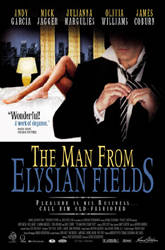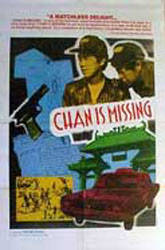 Director: Starring:
OTHER REVIEWS: |
The Man from Elysian Fields BY: DAVID PERRY The Man from Elysian Fields may be the most meticulously fictional film about writers to come out this year. Lacking the dramatic tension and strong characters that made gems like Wonder Boys so unforgettable, the film does squander some of its best moments, but all in all, it comes across as a handsomely made and intriguing little diversion for two hours. The character at the center, Byron Tiller (Garcia), is himself a novelist, having spent 7 years writing a bargain basement book called Hitler's Child theorizing that Adolf Hitler and Eva Braun had a child who was raised in Argentina by neo-Nazis. Needless to say, the horrible plot kept the novel from every making it beyond a couple good reviews (The New York Times compares him to Ernest Hemingway) and quick trip to the book dealers' bargain bin. Living in Pasadena with his wife Dena (Marguilies) and son (named Nathaniel Hawthrone Tiller), Byron is finding it impossible to live off of his art. He has the pretentiousness to write interesting tales of "microcosms" but lacks the popular value that his Little, Brown Books publisher is looking for. As the publisher puts it, when someone is reading a book on the bus, they don't want to read about their life being little more than part of a microcosm. After failing to get publishing, much less an advance, for his latest novel about migrant workers and their lives in relation to Excalibur, Byron lies to his wife to make it seem like things aren't so bad. Soon he's telling her that he's been meeting with the Book of the Month Club despite the fact that no one wants to publish the book in the first place. After failing to get his old advertising job and finding it impossibly embarrassing to ask Dena's rich father for the money, Byron decides to attempt to get the needed money elsewhere. Instead of becoming Jerry Lundegaard from Fargo, though, Byron decides to sin in another way. As he sits drinking away his problems, he is approached by a perfectly groomed and spoken man named Luther Fox (Jagger) who is willing to give Byron a chance to make some money. It seems that Fox owns an escort service for the most affluent city socialites called Elysian Fields. As fate would have it, the Elysian Fields office is just a couple doors down from the office Byron rents so he can write his novels in peace. After much introspection, Byron decides to take Fox on the offer as long as he doesn't have to sleep with the women he escorts (the film never really explains how the biggest socialites can afford to be seen with men other than their husbands at big events like the opera). As luck would have it, his first client is Andrea Alcott (Williams), a beautiful woman in her thirties who is willing to leave Byron standing on the sidewalk after they attend the opera together. On the second date, when she tells Byron he must get into the limo with her, things start falling apart. Superficially, they shouldn't: Andrea's husband is the much, much older Tobias Alcott (Coburn), a Pulitzer Prize winning author who is working on his swan song. Tobias, now impotent, is glad to have his wife pleasured by someone -- even if it cannot be him, he's content that someone's making her happy. With another aspiring writer in the house all the time, this gives an asset to Tobias and Byron: one needs a person to clean up his ranting, elderly prose and keep his reputation, the other needs the success of a co-authorship with a high-class author. The reason that The Man from Elysian Fields succeeds much better than it would as a simple story of two authors learning from each other, is that it has the dynamics of a marriage that must bend and break under the pressure of such occupational obligations. Despite a horrible performance from Margulies, the character of Dena helps to ground the film better than would otherwise happen. Director George Hickenlooper, best known for his documentary Hearts of Darkness: A Filmmaker's Apocalypse (co-directed with Fax Bahr), creates the needed mood to show the devilishness inherent in Luther Fox and the blustering joie de vivre of Tobias Alcott. It helps that he has game actors like Mick Jagger and James Coburn to bring these characters to life. Much of The Man from Elysian Fields plays like a novel, which adds to much of its appeal. At the end, it is surprising to read "Written by Phillip Jayson Lasker" without any "Adapted from" credit. Much of the film seems to be straight from some methodically paced novel, including the film's disingenuous use of multiple crescendos in preparation for an ending (one particular moment that shows a terrific side to musician-cum-actor Michael Des Barres would have made a perfectly cynical ending that would have fit with the style and theme of the rest of the film). The film serves as James Coburn's real swan song, which
makes many of his scenes all the more painful. Watching him worry about all the aches and
pains in his old body finally leading to an ending becomes downright depressing when
considering just how painful the final years of Coburn's real life was (bringing back
memories of the unfortunate stories of Richard Farnsworth's battle with cancer two years
ago). But just when fears of the film becoming maudlin with sentiment at a lost legend,
Coburn reminds the audience of why he was a legend in first place: by socking a critic in
the face. |




